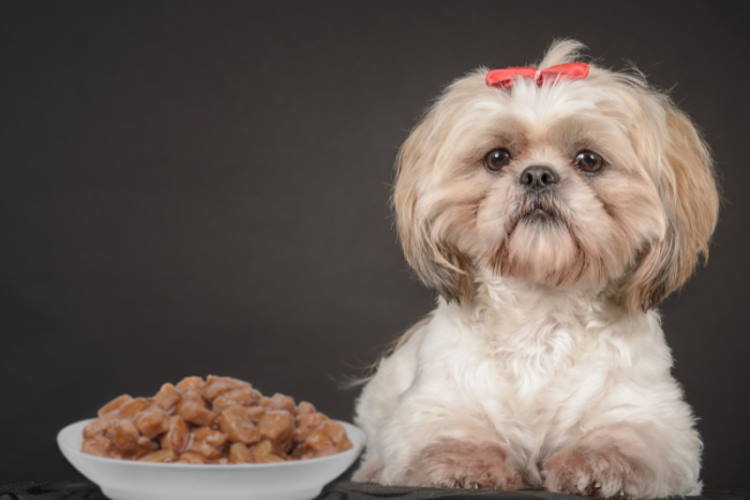- Home
- Shih Tzu diet
- grain-free diet
Is A Grain-Free Diet The Right Choice For Your Dog? What All Dog Moms And Dads Should Know
WRITTEN BY STACY | EVERYTHINGSHIHTZU.COM
As a dog lover, you want what's best for your pet, and that includes feeding her the healthiest diet possible. With so many options on the market, including a recent uptick in trendy, gourmet diets, how do you choose?
Grain-free diets for dogs have been promoted as a way to provide extra energy for your pup due to the higher protein content (often at a higher price tag). Grain-free foods are also often associated with relief from allergies, digestive issues, and other health conditions.
However, recent research points to the possibility of grain-free foods being linked to a dangerous heart condition for dogs known as Dilated Cardiomyopathy. But, it has not been definitively proven.

When deciding on the right food for your dog, always know your options. If you have doubts or questions, be sure to discuss the situation with your vet and ask for some professional guidance.
In many cases, unless your dog has certain unique conditions, she won't need to eat specialized food.
To decide whether a grain-free diet is right for your dog, you first need to know what it is and how it impacts your canine companion.
What Is a Grain-Free Diet?
A grain-free diet is simply when your pup consumes foods that do not contain grains like wheat, soy, barley, and others. You remove all grain sources from your dog's diet, including corn, millet, and rice.
Grain-free does not mean low-carb, "diet" food, weight-loss plan, or healthier. Instead, grain-free is when the grains in different products are replaced with alternatives, usually plant-based complex carbohydrates like sweet potatoes and legumes.
Grain-free dog foods can also include a higher protein content, although every food is different.
What Is the Advantage of Grain-Free Dog Food?
Better Digestion
In some cases, eating grain-free dog food can help with any digestive issues your pup may have. Of course, this is only assuming your dog has problems with her digestion in the first place. If your pup has a condition that makes it hard for her digestive system to break down grains, then a grain-free diet can be a great solution.
Energy Boost
If the grain-free dog food you choose has a high protein content, this added protein can help boost your pup's energy levels. Again, this is assuming your dog needs more energy or participates in activities where extra energy is essential (think police dogs, herding dogs, and other dogs with highly-active "jobs").
Allergies
Another scenario in which grain-free can be helpful is if your pup suffers from allergies.
Of course, your first step is to talk with your vet and narrow down the cause of your dog's allergic reactions. If your vet finds your pup has an allergy to grains, then grain-free could be for you.
You also might find your dog is sensitive to only particular grains and can simply look for food that doesn't contain the offending grain in the ingredient list.
Is It Healthier for a Dog To Eat Grain-Free Food?
In a nutshell, grain-free doesn't automatically mean healthier. It all depends on your pup and the exact food you purchase.
For example, if your dog is very active, then a higher-calorie, higher-protein grain-free food might be the healthiest option. However, if your pup is older or less-active, a grain-free diet can potentially lead to weight gain.
Sometimes, grain-free foods can be higher in calories because of the ingredients that replace the grains.
Therefore, it's important to assess each food individually instead of lumping all grain-free dog food together into the same pile. Most of the time, if your dog doesn't have any specific issues that warrant a grain-free diet (suggested by your vet), then a grain-free diet won't be any healthier for your pup than one with grains.

Why Is Grain Controversial for Dogs?
Why did grain-free dog food develop in the first place? Well, you could point to several different reasons.
There's always the obvious; marketing and setting up a trend -- advertising has done a great job pushing the myth that grain-free is the healthiest diet for all dogs, and eating grains are harmful to your pup.
In truth, grain-free and with-grain is all a matter of preference and what works for an individual dog.
Some dogs can benefit from grain-free diets, while others can potentially experience consequences from it.
Plus, not all grain-free dog foods are created equal. Therefore, a better course of action would be to look at the ingredient list on the label, instead of any catch-phrases or marketing hype.
Dilated Cardiomyopathy (DCM)
Perhaps the biggest controversy associated with grain-free dog foods is its link to the canine heart condition, Dilated Cardiomyopathy, or an enlarged heart.
This disease affects the heart muscle in a way that keeps the heart from functioning properly. The heart can no longer pump blood efficiently, so blood can't get to the rest of the body.
Instead, the blood settles in various tissues, including throughout the lungs. The condition varies in severity, but most often is long-term and fatal.
A dog's quality of life depends on the treatment given, long-term care, and the underlying cause of the disease.
In recent studies of dogs with DCM, the FDA found that 90% of these pups were on a grain-free diet.
However, it's important to note that merely eating grain-free wasn't the only point. Rather, it was what alternative foods were present in these grain-free varieties.
In many cases, about 93%, the ingredients replacing the grains were lentils and peas. In other cases, it was potatoes.
There was also a look at foods known as "BEG" diets (Boutique, exotic, grain-free).
Some boutique type dog-foods, or super-trendy (pricey) varieties, feature exotic fruits and vegetables that may also cause health issues for dogs.
There just isn't enough information and research yet on how these different ingredients affect canines.
Therefore, these stats pose the question, could grain-free cause DCM, or is it the specific ingredients like lentils, potatoes, and other legumes, that are the culprits?
In reality, there is no actual proof to clearly state that grain-free diets cause dilated cardiomyopathy and heart failure in dogs. However, the research is strong and definitely begs the question, is it worth the risk?
Signs of DCM are:
- Abdominal distention
- Collapse
- Trouble breathing
- Heavy panting
- Coughing
- Lethargy
- Loss of appetite
If you notice any of these signs in your dog, whether she's eating grain-free food or not, contact your vet.
When it comes to selecting the perfect food for your pup, you need to arm yourself with the current, fact-based knowledge about different ingredients, dog foods, and potential issues.
It's always a good idea to talk to your vet if you are unsure about a particular food.
If your pup won't get any real benefit from eating grain-free, there really isn't a reason to choose this type of diet.
On the other hand, if your dog has specific health issues that call for a grain-free menu, your vet can point you in the right direction of your best options.
- Home
- Shih Tzu diet
- grain-free diet



